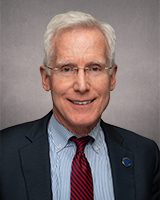Join Us As We Confront Ageism in the Media

It’s a shocking, sobering scenario for anyone working in the field of gerontology — in the runup to the U.S. presidential election this November, the national conversation is daily, perhaps hourly, dominated by utter ageism.
It often starts with the news media, particularly in op-eds and on-air commentary, where audiences of millions are exposed to ageist messages. This in turn prompts responses in online forums and social media platforms, even everyday conversations among family, friends, and colleagues. And when someone as educated as a special counsel so egregiously demonstrates his innate bias against older people, it’s a sad reminder that ageism is epidemic in America.
This spread of ageism will only grow in intensity until Election Day, resulting in more instances than any one organization or person can respond to individually. But together, we can be allies in stemming the tide of ageist messages and promoting a more accurate story of aging. We have a new tool, the Responding to Ageist Election Coverage in the Media Guide, developed by the National Center to Reframe Aging at GSA, that can help us respond — whether it be in your community media outlets or one-on-one conversations with friends and family.
We all know the harms of ageism, but many do not, and what is largely lacking in the media dialog I’ve seen is enough input of experts on aging. On February 20, the National Center hosted a webinar to help us all be effective communicators. Moira O’Neil from the FrameWorks Insitute and John Beilenson from SCP joined the National Center to discuss reframing strategies to employ when responding to ageist election media coverage and tips for writing effective opinion pieces.
I invite all GSA members to join us in speaking out against ageism when you see it. As the nation’s experts, we all have a role to play, and this is our time to speak up.